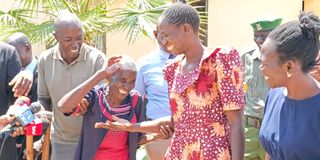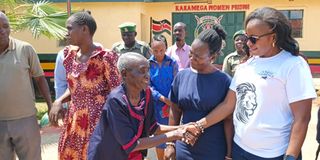
Sabina Isutsa, 94, is greeted by relatives and well-wishers after her release from Kakamega Women's Prison on April 17, 2025. She was released on bail by the community-based organisation African Center for Non-Violence.
There was joy and celebration at the Kakamega Women’s Prison when 94-year-old Sabina Isutsa — probably one of the oldest convicts in Kenya — was released from prison.
The widowed grandmother and her daughter-in-law, Priscila Wanjila, 37, had been convicted of malicious damage over a disputed parcel of land.
The two were found guilty of damaging napier grass on a piece of land in Ishisecheli Village, Eregi, Kakamega County, which they alleged belonged to Ms Isutsa. A neighbour had accused them of damaging the grass, leading to their arrest and conviction.

Sabina Isutsa, 94, is greeted by relatives and well-wishers after her release from Kakamega Women's Prison on April 17, 2025. She was released on bail by the community-based organisation African Center for Non-Violence.
The nonagenarian was to serve a one-year sentence at the Kakamega Women’s Prison after failing to raise a fine of Sh23,000 which was the alternative punishment.
Despite her advanced age, she remained behind bars from November 2024 until April 17, 2025, when well-wishers came to her rescue, paying her fine before she completed her sentence.
The African Center for Non-Violence Today (AfriNov), an organisation that operates in the Western region, settled her fine, leading to her release.
At 94, Sabina Isutsa has seen it all. Her life’s journey now includes a stint in jail. The family says her mental faculties have deteriorated, and she can no longer recall or articulate issues clearly.
Her daughter-in-law, Ms Wanjila, who served two-and-a-half months in prison before her husband settled her Sh30,000 fine, spoke about their treatment by the justice system, describing life in prison as extremely intimidating.
She said the congestion made her mother-in-law more vulnerable to diseases, given her already weak immune system.
“Life in prison is so challenging. You cannot go where you want or eat what you want—everything is monitored and controlled,” she said.
At one point, Ms Isutsa slipped and dislocated her right hip, requiring transfer to Moi Teaching and Referral Hospital in Eldoret for treatment.
Ms Ann Sailet, Deputy Officer-in-Charge at Kakamega Women’s Prison, described the grandmother as a source of hope and joy, often praying for fellow inmates.
“We are happy to reintegrate her back into her family after six months. She brought joy to prison staff and inmates alike, and we wish her well,” Ms Sailet said.

A cheerful Sabina Isutsa, 94, is released from Kakamega Women's Prison on April 17, 2025, after being bailed out by a community-based organization, African Center for Non-Violence.
Ms Mary Shimwenyi, a mediator working with AfriNov, said the organisation stepped in after learning about the 94-year-old’s plight.
“She was in hospital with a Sh70,000 bill for a metal implant in her bones. We felt she deserved better and decided to stand with her,” Ms Shimwenyi said.
She added that AfriNov plans to return to court to apply for a review of the case to understand how the elderly woman allegedly lost her land, which ultimately led to her incarceration.
Isutsa’s case sheds light on the challenges elderly prisoners face, especially those with chronic illnesses. It also raises concerns about whether senior citizens should remain incarcerated when the state cannot provide adequate care.
Ms Linet Mwale, an activist, opposed keeping people over the age of 70 years in harsh prison conditions, especially those who do not pose a risk to society.
“Continued incarceration of the elderly is akin to a slow death sentence. Many of them are unnecessarily kept in prison even though their detention does little to serve the purposes of punishment, deterrence, or rehabilitation,” she said.
She called for the justice system to design proportionate punishments for elderly persons, arguing that incarcerating non-threatening seniors violates their rights.
Lawyer Patrick Mung’oma agreed, noting there is currently no provision in law specifically protecting elderly persons from imprisonment.
“It is a legal gap that must be addressed to protect elderly individuals from spending their remaining years behind bars,” Mr Mung’oma said.
The release of Ms Isutsa from prison evoked mixed emotions—relief and joy. Volunteers brought gifts, including Easter care packages containing soap, food, clothing, and bedding.
Ms Jael Onyango led a team of well-wishers who welcomed Ms Isutsa as she stepped out of the prison gate.
“Reintegration into society will be difficult for her. While she is happy to be with her family again, she has no plan for her future sustenance. That’s why we came together to provide her with basic necessities,” said Ms Onyango.









